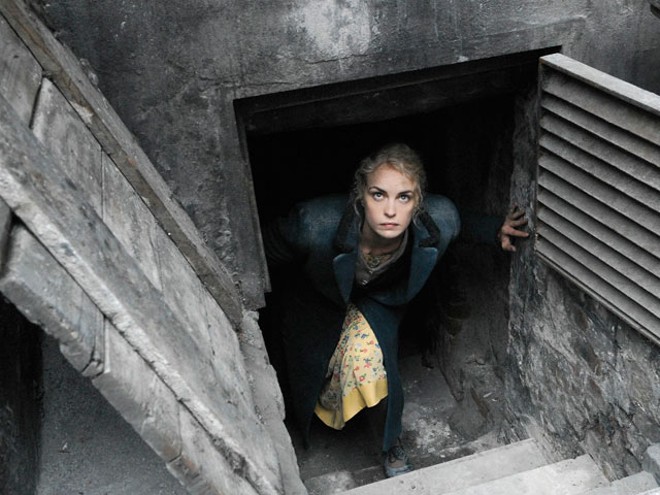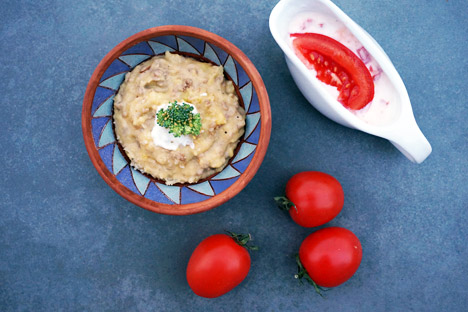- The author is being interviewed today on 'The World' on NPR. It is a memoir and a history of Russia and the USSR via food and the food described in classic Russian literature.
- So I offer Mastering the Art of Soviet Cooking with a caveat. Bremzen’s memoir is informative, moving, and at times, harrowing. Bremzen’s memoir is informative, moving, and at times, harrowing.
Mastering the Art of Soviet Cooking is as much a history of Soviet life as it is a personal story. Both narratives are provocative and delicious, and both are worth telling your children.Mario Batali, chef, author, entrepreneur. In Mastering the Art of Soviet Cooking, von Bremzen follows in the footsteps of Nigel Slater's Toast and Anthony Bourdain's Kitchen Confidential: memoirs about life, love and food that linger long after the last page is turned. Her tale is a nostalgia-laden compendium of madeleine moments.A banquet of anecdote that brings an entire history to life with intimacy, candor and glorious color.'
Anya Von Bremzen is a skilled writer whose first cookbook, Please to the Table, landed her a James Beard Award. Five more cookbooks and extensive journalism followed.
But what distinguishes Von Bremzen is her background. Born in the Soviet Union in 1963, she has always strongly identified as Soviet. Other individuals hailing from the former Union of Soviet Socialist Republics don’t identify as such; they invariably revert to the names of their former (and/or current homelands), e.g. “I’m Latvian”, “I’m Ukrainian”, (this last spat with especial rage.) I am, that is, whatever my family and region were called before the October 1917 revolution destroyed our lives, took away our homes, our lands, the very food on our plates.
Despite this, Von Bremzen’s book is subtitled “A Memoir of Food and Longing”. And what Von Bremzen longs for is life under the Soviet boot, partially written through a gastronomic lens.
When Von Bremzen writes of her childhood, her relatives, their lives, the foods they cooked, even readers who consider themselves well-informed about life in Soviet Russia will be appalled anew. When Von Bremzen discusses her dynamo of a mother, Larisa, the reader will be, as the English say, gobsmacked. A magnificent cook, Larisa pores over literature, often attempting to replicate the dishes found there. Her version of pot au feu, a classic French farmhouse stew, chockablock with short ribs, onions, carrots, and leeks, accompanied by dishes of fleur du sel and cornichons, employed cabbage. Period. She read about it in Goethe.
Larisa is starving for more than food. She meets Von Bremzen’s father, Sergei, while standing in an all-night line, waiting for ballet tickets. Her disgust with the USSR is pronounced and palpable: she is fearless, unbowed even as her marriage to the one man she will ever love fails. Her beloved daughter, Anya, is named after the defiant poet Anna Ahkmatova.
The problems begin when Von Bremzen moves from family and food to the Soviet Union’s enormously complex history. Von Bremzen is a meticulous historian, having either lived events herself or availing herself of family and friends who recount hideous privation under a series of monstrous rulers. This recounting, most often of famine, illness, and cold, epitomizes the stereotypical notions of frozen people lined up for a bit of rotting bread, or worse. Yet many of the book’s famed readers are moved to comment on Mastering the Art of Soviet Cooking’s humor.

Ian Frazier blurbs exuberantly, “The funniest and truest book I’ve read about Russia in years.”
Add the estimable Francine du Plessix Gray, who calls Mastering the Art of Soviet Cooking “…poignant, vivid, often hilarious…”
While somebody in the Mario Batali camp—an assistant hired to read for him? Offers this: “…her prose is at its tangiest, richest, and tastiest in these passages… both narratives (personal and historical) are provocative and delicious.”
Poignant, vivid, yes. But the passages where Larisa’s family is evacuated from Moscow during World War II to a 700 square-foot room with six other families are not amusing. The prostitute living beside them neglects her infant son. He wails ceaselessly — until he doesn’t. Larisa, a child, is witness.
Soviet Cooking Pot
It’s not hilarious when Larisa’s father, Naum, nearly perishes of pneumonia. He pens a letter to wife Liza, imploring her to teach their children to toss grenades. On a wider scale, the murders, assassinations, genocide, and mass starvation make for wearying, depressing reading. The violent oppression of religious worship, the raging Anti-Semitism, and the continuing, crushing problems with alcoholism aren’t the least bit “delicious”. All are examples of the ugliness humans continue to visit upon one another.Their relation to food is primarily the lack thereof.
Von Bremzen’s discussion of Soviet history includes a information about how many of her beloved foods came to be. Kotleti, a Soviet take on the American burger, was the result of a visit to the United States. The burger made it back, albeit without the bun, calling instead for onion, garlic, dill or parsley, and mayonnaise mixed together, coated in bread crumbs, and fried in canola oil. Sosiski and Kolbasa are sausages, and there’s the beet soup American Jews call borscht, spelled here Borshch.
The Anti-Semitism that drove so many Jews out of the USSR prompts Von Bremzen and her mother emigrate to Philadelphia in 1974. Larisa finds work cleaning houses, then in a hospital. Von Bremzen, 11 years old, hates the United States. Unlike her fellow countrymen, the supermarket, with its enormous, sanitary expanses, does not bring tears of joy. Where are the smells? She describes fellow immigrants sniffing hopelessly at rocklike packaged strawberries, of neighbors eating cat food (they did not realize it was for pets, and found it delicious), of the family that complained about the terrible butter: they were spreading their bread with floor wax.
Each day Von Bremzen attended school, then came home to an empty apartment—Larisa worked late. She ate bologna on white bread while pining for kolbasa and sourdough rye, and watches Dinah Shore. She misses the convivial waiting in line for food, the social life, the wheeling and dealing.

Their fellow immigrants warn them against decorating for the New Year: their benefactor, the Jewish Family Service, mistaking the greenery for Christmas decorating, will be gravely offended. Larisa and Anya, in no way observant—most of their family have chosen to hide their Judaism—are bewildered but comply.

Beyond this, scarce little is said about their move to the United States; instead the narrative leaps forward to Von Bremzen’s late teens. She has moved with Larisa to New York City, where the food is better. They have acclimated. Perestroika means visiting relatives is possible.
The book closes with Von Bremzen, Larisa, and Von Bremzen’s partner, writer Barry Yourgrau, returning to Russia, where both women are invited to cook on television. They stay in a “sumptuous” penthouse in the now-gentrified neighborhood where Von Bremzen grew up. Von Bremzen and Yourgrau walk the neighborhood, now incredibly expensive, crammed with high-end shops found worldwide: Diesel, Commes Des Garcons. The biggest scandal? Von Bremzen’s decision to wear flip-flops. Her bare toes cause commentary everywhere.
The book closes with recipes from the 1910’s to the present day. Some, like Palov, or pilaf, will be familiar to readers, as will the aforementioned Borshch. There’s a recipe for Kulebiaka, a fish encased in pastry that truly is for the greatly skilled. Even in this simplified version, a gefilte fish recipe, many would argue with (including me) but gefilte fish is one of those recipes: ten Jews, ten recipes, everyone’s grandmother make it best, and no, that jarred stuff is not gelfite fish. Of course, there’s a recipe for blini, for what would a book on Russian food and history be without blini?
Ultimately, Mastering the Art of Soviet Cooking is far more of a historical book than the telling of one woman’s experience. While not bad in itself, it’s misleading to those of us less inclined toward what at times reads like a John Keegan book. (Okay: I’m a lightweight.) While Von Bremzen has every right to create such a memoir, I wish the emphasis on Soviet history was more honestly put forth to potential readers.
Youtube Vietnam Cooking

So I offer Mastering the Art of Soviet Cooking with a caveat. Bremzen’s memoir is informative, moving, and at times, harrowing. Larisa Frumkova, her mother, is nothing less than a heroine. The food writing is wonderful. If you are history buff, you’ll love this book. If you are less inclined, you may find parts of Mastering the Art of Soviet Cooking rough going. The fault will lie with you, as it does with me, for this is an important contribution to the literature of food, especially that of Eastern Europe.
Soviet Recipes
But no sugar in the gefilte fish, okay?
